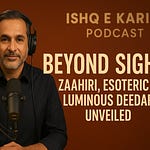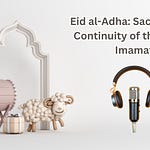Pluralism means not only accepting but embracing human differences. It sees world variety as a blessing rather than a burden. Regarding encounters with others as opportunities rather than a threat
His Highness the Agakhan (IV) (49th Imam of Shia Imami Ismaili Muslims)
Embracing Diversity and Unity Through Faith
Yaa Ali Madad.
Welcome to the very first episode of our podcast on Embracing Diversity. It is an honor to have you join me on this meaningful journey. I would like to begin this episode with a heartfelt and humble prayer, seeking guidance and wisdom for us all. Ameen.
When we observe the world around us, it is evident that science and technology have progressed immensely, yet this progress is just the beginning.
The Holy Qur'an mentions:
"We will show them Our signs in the horizons and within themselves until it becomes clear to them that it is the truth. But is it not sufficient concerning your Lord that He is, over all things, a Witness?"
(Surah Fussilat 41:53)
Indeed, remarkable evolution awaits us. Even movies, in a way, reflect the miracles of God's power—manifestations of thought and creativity. As the famous line from Spider-Man goes:
"With great power comes great responsibility."
As we experience advancements, we gain immense power to communicate, connect digitally, and travel extensively. However, with every blessing comes responsibility.
Everything in this world has two sides—a positive and a negative. It is up to us to choose how we use it. For example, we can leverage technology to gain knowledge, connect with others, and spread positivity. Conversely, it can also be misused for spreading misinformation or harbouring destructive intentions
You may wonder why I chose the title "Diversity" while discussing the two sides of evolution.
How does this relate to diversity, evolution, and our choices? Let’s dive in.
God's most incredible creation is humanity's colourful diversity, much like a garden filled with vibrant flowers. Each flower represents a person, and the variety of colours symbolises people's unique backgrounds, ethnicities, and languages.
Picture a garden filled with vibrant flowers, each one unique yet contributing to a harmonious whole. Humanity is like this garden. People from different cultures, languages, and traditions are the flowers that make this world beautiful.
The Qur'an beautifully highlights this in Surah Ar-Rum:
"And among His signs is the creation of the heavens and the earth, and the diversity of your languages and your colors. Indeed, in that are signs for those of knowledge."
This verse ends the debate on why diversity exists.
Diversity is not a flaw but a sign of divine wisdom for those who seek knowledge.
Consider the moon (Chand). For some, it marks the day of Eid; for others, it signifies the end of a fast or a spiritual connection with a teacher during Guru Purnima. Despite the differences, the moon remains a common element.
Similarly, people of various faiths may refer to the divine by different names—God, Ishwar, or Allah. Still, the essence is the same: the universal Noorani power that created the world.
As the Shahada declares: La ilaha illa Allah—there is no god but God.
The Bible speaks of the One true God, and the Geeta refers to Parmaatma. The message is universal: though languages and traditions differ, the essence of divinity unites us all.
His Highness the Aga Khan said:
"Diversity is not a weakness; it is a strength that allows us to learn from each other’s differences."
Why do we feel threatened by diversity when it is an opportunity to grow? Every culture and tradition has something unique to offer.
For instance, if I meet a Hindu friend as a Muslim, I could ask about the Bhagavad Gita. Its teachings resonate with the principles of the Qur'an.
Consider this verse from the Bhagavad Geeta:
"This is mine, that is yours—such is the calculation of the narrow-minded. For the magnanimous, however, the entire world is one family."
(Maha Upanishad, Chapter 6, Verse 72)
Now compare it to this verse from the Qur'an:
"O mankind, fear your Lord, who created you from a single soul and created from it its mate and dispersed from both of them many men and women..."
(Surah An-Nisa 4:1)
Both verses emphasise unity and the idea that we are one family. Both scriptures emphasise unity and remind us that we are all connected.
The Qur'an further says:
"O mankind, indeed We have created you from a male and a female and made you peoples and tribes that you may know one another..."
(Surah Al-Hujurat 49:13)
God encourages us to know each other—not in an ordinary way but by learning from one another and appreciating the essence of our diverse traditions.
As His Highness the Aga Khan remarked during a speech:
"Diversity is not a burden to be endured, but an opportunity."
Unfortunately, we often focus on rituals and overlook the essence of faith. The essence is what truly matters. One key essence is embracing diversity and learning from it. We must embrace the essence of faith and the diversity it celebrates.
Even though God's message is clear, our ignorance often prevents us from accepting one another. As I mentioned earlier, material or spiritual evolution has two sides. When I reflect on our holy scriptures, it becomes evident that how we interpret them is entirely up to us.
If we approach the scriptures with a selfless and open heart, we uncover a profound truth: our earth can be even more beautiful than heaven when harmony and understanding prevail. However, just like material evolution, religious understanding can lead to errors if we fail to interpret it correctly.
God has blessed us with intellect, empowering us to interpret and discern. How we use this gift is our responsibility. In this context, we may draw wisdom from the famous dialogue in the Spider-Man movie: "With great power comes great responsibility."
It is our power to interpret, and with that power comes the duty to do so responsibly. Let us use this gift wisely, fostering unity, compassion, and understanding.
As His Highness the Aga Khan said: "The thing which separates man from the animals is his power of thought. "
Knowing each other goes beyond surface-level interactions. It means understanding, learning, and appreciating the wisdom of others. We must embrace the essence of faith and the diversity it celebrates.
As we conclude, let us remember that diversity is a blessing, not a burden. It is our ignorance, not our differences, that creates conflict.
I’ll leave you with one final thought from His Highness the Aga Khan:
"Diversity is not a reason to put up walls, but rather to open windows. It is not a burden, it is a blessing."
In our next episode, we’ll discuss how ignorance fuels conflict and explore the call for pluralism in various scriptures.
Thank you for tuning in to this episode of our podcast. We hope you found it inspiring and thought-provoking. To stay connected and explore more, we warmly invite you to visit our website at www.ishqekarimi.com. Don’t forget to subscribe to our YouTube channel for more enriching content.
You can also listen to us on Spotify and Apple Podcasts for a seamless and on-the-go experience. Your support means the world to us, so please like, share, and leave us your valuable feedback. Until next time, take care and stay inspired!"
Thank you for listening to Ishq-e-Karimi. Until next time, Ya Ali Madad.












